Graduate Program Allows Practicing Music Therapists to Develop into Leaders and Visionaries in Field
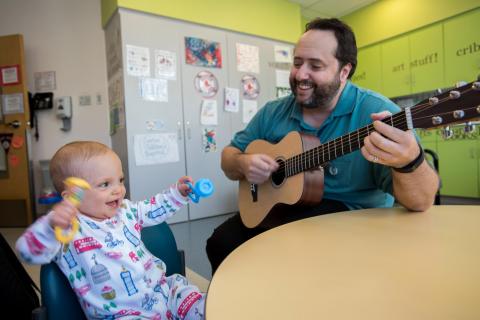
Brian Jantz '98, a student in Berklee's graduate program in music therapy and an assistant professor in the undergraduate program, delights a young patient at Boston Children's Hospital.
KC Cohen, Boston Children's Hospital
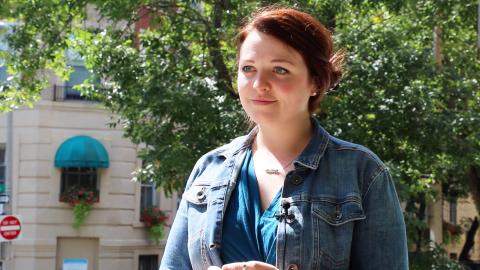
Channing Shippen '11 is a graduate student at Berklee and works full-time at Dana-Farber’s Jimmy Fund clinic in Boston.
Ray Seol
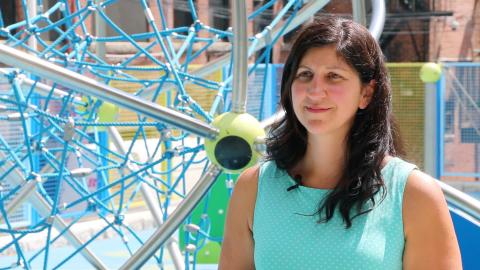
Graduate student Nicole O'Malley has worked as a music therapist for 10 years.
Ray Seol
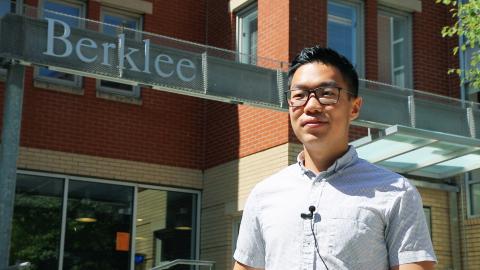
Graduate student Kevin Leong '15 helped found the music therapy program at Rosie's Place, a women's shelter in Boston.
Ray Seol
It’s easy to see why children with cancer often don’t look forward to going to Dana-Farber’s Jimmy Fund clinic in Boston. It’s where they get stuck with needles, where they take medications that make them feel badly. Considering these experiences, it can be tough to get kids to see the hospital as a fun and exciting place. But making it less frightening, and even enjoyable, is part of what music therapist Channing Shippen '11 does every day.
Whether it’s distracting kids during blood draws or simply providing a bit of normalcy and joy to shift the focused from their illness, Shippen works to make children’s experiences at the cancer center less negative and hurtful. And each day she’s getting better at it, thanks in part to what she’s doing outside of the hospital.
Shippen, who majored in music therapy as an undergraduate at Berklee, is one of 30 students in Berklee’s two-year, low-residency master’s degree program in music therapy. “As a music therapist, I think [graduate school] is the step we need to take to further our profession. Gaining understanding at a graduate level is very different than having an understanding at a bachelor’s level,” Shippen says. “There are so many lessons I never would have learned if I had not sought this program out.”
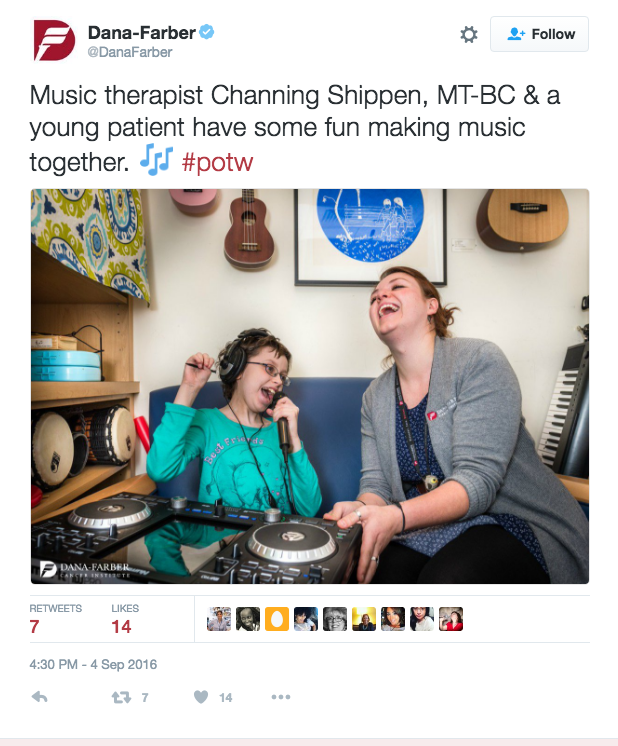
Like her classmates, she is a working therapist who needed a program that would allow her to keep her job while she deepens her knowledge of the field. “Our program is really targeted to the practicing music therapist,” Joy Allen, the recently appointed chair of Berklee’s Music Therapy Department, says of the graduate program. Its students live across the United States and abroad, working in their own practices and sometimes employing other music therapists.
Considering the student body, one of the program’s key characteristics is that is can be molded to fit into each student’s daily planner. “The professors here are very flexible with our schedule. So as long as we get our work in by the end of the week, we are able to digest the information and at the same time learn what we need to learn,” says Kevin Leong ‘15, who helped start a music therapy program at Rosie’s Place, a women’s shelter in Boston.
Most of the course work is completed online, but each semester, students come to the Berklee campus for five days of learning retreats and extensive hands-on time to practice new techniques and collaborate in person. The rest of the time they maintain a tight online community.
Nicole O’Malley, a second-year student who lives in Rhode Island, said that, as a mom and a music therapy business-owner, she needed a program that would allow her to maintain these roles while advancing her education and building connections with other music therapists. It’s a network she finds invaluable: “We interact all of the time. We text, we work on Facebook, we have email. And any time anybody needs something, somebody has a resource to fill in the gap.”
O’Malley has been a music therapist for 10 years and said that she originally enrolled in the program mostly to get her master’s degree, but quickly found that it offered her more than that. “I would come just for the information, and almost not the certificate, not the degree. The content is just that valuable,” she says, adding that it’s transformed her practice by making it more evidence-based and by enabling her to work with populations she wasn’t servicing before.
Listen to Joy Allen on music therapy at Berklee:
The program is divided into two tracks: research and integrative medicine. But, says Shippen, there is plenty of information crossover between the two, so students are able to take what they need from each track to build their own practice.
For Leong, this concentration on research and science has helped him to better access his clients. While his undergraduate program taught him to be strong musically, the graduate program is training him to be academically solid. “Coming back to the Berklee graduate program, we have a focus on the neuroscience model, we know the mechanism behind why [music therapy] works, and we can utilize that to our benefit in a much more effective manner.”
It’s this expertise and knowledge that more employers want, says Allen. As the music therapy job market grows, and more and more physicians, nurses, and social workers want music therapists in their facilities, there’s an accompanying push for therapists who have master’s degrees.
“These are going to be the leaders and the visionaries of the field and we’re helping them get the skills to take them to the next level,” she says.